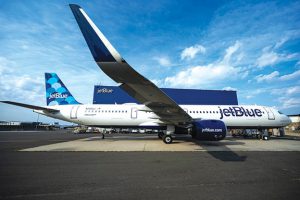Bloomberg
JetBlue Airways Corp reported a second-quarter loss that missed Wall Street’s expectations as high fuel prices kept operating expenses elevated ahead of the carrier’s planned purchase of deep discounter Spirit Airlines Inc.
The carrier’s shares fell after it said total costs soared 89% in the quarter to $2.56 billion, including $910 million spent on fuel. JetBlue is starting a new cost-reduction program that should deliver savings of as much as $250 million a year by 2024, including a decision to accelerate the retirement of its Embraer E190 aircraft.
“Higher spending on fuel and salaries drove a much larger adjusted net loss,†Helane Becker, a Cowen analyst, said in a note. Investors will likely have “concerns about cost management.â€
Sustained high costs remain an obstacle as JetBlue tries to capitalise on rebounding travel demand and grow through a merger with Spirit. JetBlue reached a deal to buy the airline for $3.8 billion in cash, ending a multimonth pursuit of ultra-low-cost carrier and fending off a rival offer for Spirit from Frontier Group Holdings Inc.
JetBlue’s adjusted loss was 47 cents a share last quarter, according to a statement, compared with an 11-cent deficit on average from analyst estimates compiled by Bloomberg. Revenue was $2.45 billion, while expectations were for $2.46 billion.
The carrier sees non-fuel costs for each seat flown a mile, a measure of efficiency, increasing as much as 17% over 2019 in the third quarter and as much as 14% for all of 2022. Continued strong demand and higher fares should help offset higher fuel prices, the carrier said.
“Revenue is tracking well to help deliver a profitable quarter, and early bookings keep us cautiously optimistic about the fall,†President Joanna Geraghty said in the statement.
JetBlue tightened its flying capacity plans for the full year to between flat and up 3% over 2019 from up as much as 5% previously.
 The Gulf Time Newspaper One of the finest business newspapers in the UAE brought to you by our professional writers and editors.
The Gulf Time Newspaper One of the finest business newspapers in the UAE brought to you by our professional writers and editors.
